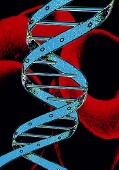Gene Boosts Resistance to Chemo Drug
SIRT1 was major factor in reaction to cisplatin, study finds.
|
E-mail this article
Subscribe to news
Printer friendly version
|

(SOURCE: National Cancer Institute, news release, Sept. 14, 2008)
MONDAY, Sept. 15 (HealthDay News) -- Increased expression of a gene called SIRT1 in cancer cells is a major factor in the development of resistance to the chemotherapy drug cisplatin, says a National Cancer Institute study.
In healthy people, the SIRT1 gene regulates a number of important cellular processes, including nutrient use and metabolism. In cancer patients, the gene appears to promote cisplatin resistance by reducing the uptake and use of glucose by cells and altering the function of their mitochondria, which produce most of the energy in cells.
The study was published the Sept. 15 issue of Molecular Cancer Research.
Cisplatin, which is used to treat many kinds of cancer, slows or stops the growth of cancer cells by binding to DNA. However, tumors that recur after an initially positive response to cisplatin are frequently resistant to the drug.
Learning more about how cancer cells become resistant to cisplatin could help lead to the development of methods to circumvent this resistance and increase the effectiveness of cisplatin.
In this study, the researchers created cancer cells that were resistant to cisplatin by exposing them to the drug in the laboratory. Higher levels of cisplatin led to a threefold to fivefold increase in expression of the SIRT1 gene and rising levels of resistance in the cancer cells.
The researchers also found that when expression of SIRT1 was reduced threefold to fivefold, the cancer cells became about twofold more sensitive to cisplatin.
"It appears that SIRT1 contributes to 50 percent of the cellular resistance to cisplatin, but it does not account for all of the resistance," study co-author Dr. Michael Gottesman, of the NCI's Center for Cancer Research, said in an institute news release.
The many other factors that can contribute to cisplatin resistance include mechanisms that limit cellular uptake of the drug, altered mechanisms that allow cells to repair damage to their DNA, and mechanisms that help cells survive.
"This study is part of a larger effort by scientists to determine important cellular changes that cause cancer cells to become resistant to chemotherapy drugs," Gottesman said. "Different types of genetic mutations can occur during the development of cellular resistance to anticancer drugs. Therefore, the first step is to elucidate the genes the contribute to this resistance in tumors."
More information
The American Cancer Society has more about chemotherapy. 
Copyright © 2008 ScoutNews, LLC. All rights reserved. 
HealthDayNews articles are derived from various sources and do not reflect federal policy. healthfinder.gov does not endorse opinions, products, or services that may appear in news stories. For more information on health topics in the news, visit the healthfinder.gov health library.